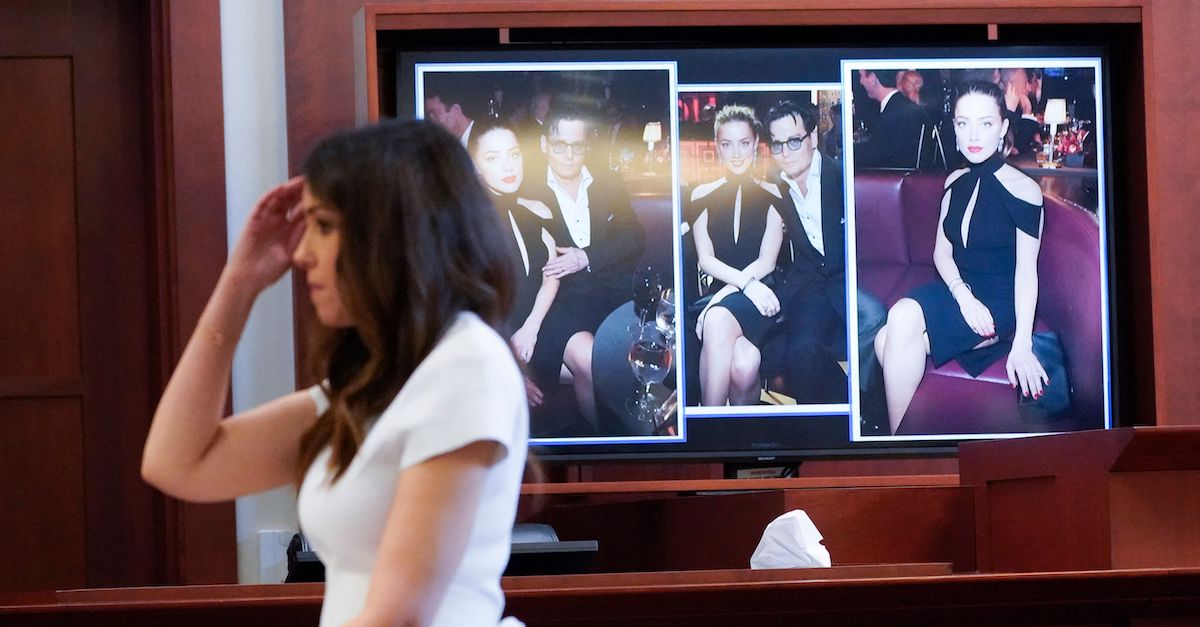
Johnny Depp’s attorney Camille Vasquez gives closing arguments at the Fairfax County Circuit Courthouse in Fairfax, Virginia, on May 27, 2022.
Just before Johnny Depp and Amber Heard’s jury began deliberations, both sets of attorneys presented sharply different legal views about whether the First Amendment protected their client’s alleged defamation.
On Heard’s side, attorney Benjamin Rottenborn argued that a jury does not even need to decide whom they believe to throw out Depp’s suit over her Washington Post op-ed published on Dec. 18, 2018. The editorial didn’t mention Depp’s name, but it noted that two years earlier she “became a public figure representing domestic abuse.”
Believe her or not, Rottenborn said, that’s true.
“This trial is about so much more than Johnny Depp v. Amber Heard. It’s about the freedom of speech,” Rottenborn said. “Stand up for it. Protect it, and reject Mr. Depp’s claims against Amber.”
Depp’s attorney Camille Vasquez bristled at that argument.
“They’ve talked about the importance of free speech,” Vasquez said, noting that she agrees with that.
“The First Amendment doesn’t protect lies that hurt and defame people, and there’s a difference,” she added. “Ms. Heard has no right to tell the world that Mr. Depp physically or sexually assaulted her when it isn’t true.”
Heard’s domestic abuse claims against Depp span from early 2013 until May 2016, the length of their 15-month marriage and earlier in their courtship.
A U.K. court that considered the case broke down Heard’s accusations into 14 alleged incidents, crediting a dozen of them.
For Heard’s theory of the case, Heard does not need to prove any of them, and she also prevails if she proves just one. Rottenborn took the further maximal view that any act of verbal, emotional, physical or sexual abuse would could for his client to be a representative of domestic violence.
Vasquez took a diametrically opposite view.
“You either believe all of it, or you believe none of it. Either she’s telling the truth, including in her most extreme allegations, or she’s lying,” the lawyer said.
In both of Vasquez’s summation addresses, she identified that “extreme” claim as the former couple’s fight in Queensland, Australia in March 2015. That’s when Heard claimed that Depp sexually assaulted her with a whiskey bottle. Depp vehemently denies that and claims that Heard was the one who assaulted him with a liquor bottle—of vodka.
Depp testified that Heard threw it at him and that it shattered and sliced off his fingertip.
For Vasquez, the jury’s judgment of Heard breaks down to a simple proposition.
“Either she was raped by a bottle, or she is the sort of person who would get on the stand in this courtroom and lie to you and the world about being raped,” Vasquez said.
Casting the question into sharper relief, the lawyer added: “What you have at the end is Ms. Heard’s word. Do you trust it?”
Heard wrote her op-ed in her capacity as an ambassador on women’s rights for the American Civil Liberties Union, which helped write her editorial during the height of the #MeToo movement. The ACLU has been criticized for its role in the case, in light of their historic role protecting the rights of due process for the accused.
For Rottenborn, the values of civil liberties and Heard’s cause were one and the same.
“We ask, ladies and gentlemen, that you hold Mr. Depp accountable for his actions,” he said. “Stand up for victims of domestic abuse everywhere, who’s suffering silence. Stand up for the freedom of speech, the freedom to speak about your life that the First Amendment protects. Give Amber Heard her voice back. Give Amber Heard her life back.”
Vasquez kicked off closing arguments on the same note of Depp seeking his life back, six years to the day that Heard sought a restraining order against him. She said that there are “no #MeToo-s” in Depp v. Heard. “Just ‘not me-s,'” she added.
The jury began deliberations shortly before 3 p.m. Eastern Time.
Read Law&Crime’s coverage of closing arguments by Johnny Depp’s attorneys here: “‘What’s at Stake in This Trial Is a Man’s Good Name’: Lawyer Urges Jury to Believe Johnny Depp and Give Him ‘His Life Back’”
Read Law&Crime’s coverage of closing arguments by Amber Heard’s attorneys here: “Amber Heard’s Lawyer Calls Johnny Depp’s Lawsuit ‘Victim-Blaming at Its Most Disgusting,’ Tells Jurors Op-Ed Was No ‘Hit Piece’”
(Photo by STEVE HELBER/POOL/AFP via Getty Images)